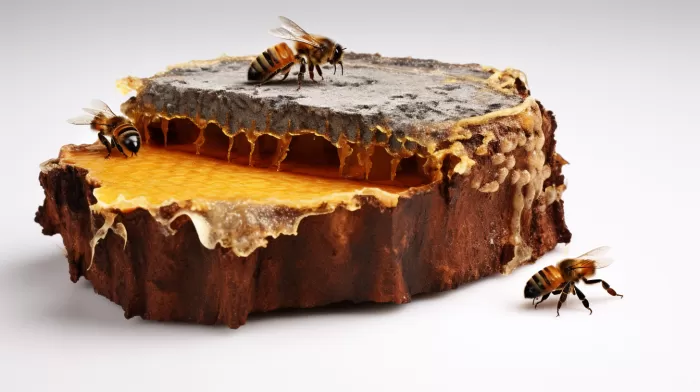Imagine a natural compound that could stop early-stage prostate cancer in its tracks, preventing it from growing any further. That compound exists, and it’s been used in traditional medicine for centuries! It’s called propolis, a resin produced by bees to seal and protect their hives. Specifically, propolis contains a compound called caffeic acid phenethyl ester (CAPE) which has been shown to halt prostate cancer in lab tests.
Propolis has long been used for treating various health issues like sore throats, allergies, burns, and even cancer but hasn’t gained mainstream medical acceptance due to questions about its cellular effects. Well, CAPE, which is extracted from propolis, might just change that.
The magic of CAPE lies in its ability to shut down the tumor cells’ system for detecting sources of nutrition. In a study conducted by researcher Richard B. Jones, Ph.D., at the University of Chicago Medicine, it was observed that feeding CAPE to mice with prostate tumors daily stopped tumor growth. However, when the treatment was stopped, the tumors resumed growing at their original pace.
The crucial aspect of these findings is that CAPE doesn’t kill cancer cells; instead, it indefinitely prevents prostate cancer from proliferating. This is an important distinction, as it means that CAPE can be used as an ongoing treatment for managing prostate tumors without the side effects associated with traditional cancer therapies like chemotherapy or radiation that targets and kills cancer cells along with healthy cells.
In the same study, human prostate tumors were grafted into mice, and the CAPE treatment was administered for six weeks. The researchers observed that the tumor volume growth rate decreased by half during the treatment. Once again, when the CAPE treatment was stopped, tumor growth resumed at its previous rate.
So, how does CAPE work its magic on prostate cancer cells? It appears to stop their ability to sense the presence of nutrients. When the cells can no longer detect nutrition, they can’t respond to the available nutrients by proliferating and growing. This unique mechanism of action of CAPE is what sets it apart from other cancer treatments.
Given these promising results, further studies and clinical trials on CAPE’s effects on prostate cancer are warranted. Its use as an adjunct therapy alongside or even in place of conventional treatments could potentially improve patient outcomes without the many negative side effects associated with chemotherapy and radiation.
As research into CAPE continues, it’s worth considering the many other health benefits that propolis has to offer. With over 300 active compounds, propolis exhibits various biological activities – including antimicrobial, antiviral, anti-inflammatory, and antioxidant properties. Some studies have even linked propolis to the prevention and treatment of dental plaque, ulcers, cold sores, and boosting the immune system.
Keep in mind that if you’re interested in supplementing with propolis or CAPE, you should consult with a healthcare provider to determine the best method of incorporating it into your health routine. Propolis or CAPE supplements can be found in an array of formats, such as capsules, tablets, creams, ointments, and even toothpaste. However, it’s best to select a product that has been tested for quality and purity.
Also, don’t forget that an ounce of prevention is worth a pound of cure. While compounds like CAPE and propolis could potentially help halt cancer growth or manage existing tumors, it’s imperative that you focus on maintaining overall health. Ensure you follow a balanced diet, exercise regularly, limit alcohol consumption, avoid toxins, and schedule regular medical checkups – all of which contribute to reducing your risk of developing cancer in the first place.
In conclusion, the discovery of CAPE’s ability to halt prostate cancer growth could be a game-changer in the fight against this disease. It may pave the way for a new treatment option that can manage the cancer without the harsh side effects of conventional therapies, further reinforcing the value and potential of natural remedies that have been used for centuries. With more research and clinical trials, we might soon see CAPE take its place in mainstream cancer treatments.



